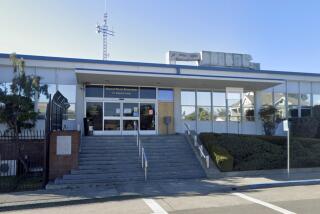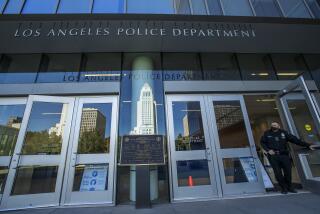Police Chiefs Seek U. S. Panel on Crime : Summit: Department heads from 11 cities ask President Bush to convene commission on violence and track instances of brutality. They say the problem of excessive force is real, linked to drugs, strife and urban decay.
- Share via
NEW YORK — Seeking to add their voices to the national debate on police brutality ignited by the Rodney G. King case, 11 police chiefs from across the country Tuesday called on President Bush to convene a national commission on crime and violence.
While declaring that there is no excuse for police abuse, the chiefs said the problem of excessive force is real and it is linked, in part, to the “difficult challenges” faced by officers in deteriorating urban centers.
“The police are continually being left to deal with the aftermath of years of urban neglect, of the rampant drug culture, of increasing criminal victimization and of a lost generation wandering the streets without employment or hope of a better future,” the chiefs said in a position paper released at a late afternoon news conference following their one-day “summit.”
The chiefs also called on the U. S. Justice Department to sponsor a national conference for law enforcement professionals on police brutality and to develop a national data-gathering system on incidents of police abuse and misconduct similar to that used by the FBI in gathering statistics for its Uniform Crime Reports.
Meanwhile, the chiefs--who represent some of the nation’s largest cities, including San Diego--said they would commit themselves to an “open, thorough” investigation of all citizen complaints of police abuse and would strive to eliminate the “code of silence” among police officers that many critics contend often makes many justified citizen complaints almost impossible to prove.
The chiefs expressed outrage over the brutality of the March 3 beating of King by Los Angeles officers, which was videotaped by an amateur photographer. They predicted that the incident would someday be seen as a “landmark in the history of law enforcement” that brought about many needed changes.
The meeting was convened by New York Police Commissioner Lee P. Brown to draw together “some of the most creative thinkers from the policing community” in efforts to formulate a plan to guide police administrators in dealing with the issue of police brutality.
“In recent weeks, a national debate on this subject has taken place, but my sense is that the voice of the law enforcement experts has not been heard adequately,” Brown said.
Brown said invitations to the meeting were selective and did not include Los Angeles Police Chief Daryl F. Gates because “he is probably dealing with the issue in his own right” at the moment.
In addition to Chief Robert Burgreen of San Diego, those attending the summit meeting included the heads of police departments in Baltimore, Boston, Bridgeport, Conn.; Chicago, Dallas, Portland, St. Petersburg and Tulsa. The chief of the New York City Transit Police also attended. Dallas Police Chief William Rathburn and St. Petersburg Chief Ernest Curtsinger are veterans of the Los Angeles Police Department.
In their five-page position paper, the chiefs said continuing decay in many of America’s cities has brought about increasing rates of homicide and other violent crimes and has exacerbated racial, ethnic and religious tensions that often flare into violence.
“There are no simple solutions to these problems,” the chiefs said. “Yet they present our nation with one of the greatest crises of our times.”
In calling on President Bush to convene a national commission, the chiefs said that police officers could not be expected to handle the crime burden alone, even with broad citizen participation.
“It will require a national commitment . . . to reverse this terrible trend,” they said. “We cannot tolerate violence in our communities or the attitude that such violence is OK because it is simply ‘minority violence.’ ”
They envision the commission as bringing together the “best minds” from a variety of disciplines to determine what action the federal government might take to improve the nation’s ailing cities.
Chicago Police Supt. Leroy Martin said he envied the support that Army Gen. H. Norman Schwarzkopf got from the government to wage war in the Persian Gulf. If police in urban centers could get that kind of support, “I could end my war in Chicago in a very timely manner,” he said.
“I mean support from the federal government to get some of the young people off the street who don’t have employment, support from the federal government to have drug treatment for those individuals who want it, support from the federal government to enhance education so our young people can find meaningful jobs when they enter the job market,” Martin said. “That’s the kind of help we need in the urban centers that we’re not receiving.”
Also called for in the chiefs’ paper were:
* Enactment by Congress of a ban on assault weapons and of the so-called Brady bill, which requires a seven-day waiting period for purchasing handguns.
* Creation by the Justice Department of a national center on community policing to provide training and technical assistance to local police agencies.
* News media help in providing the public with a more in-depth analysis of law enforcement.
More to Read
Sign up for Essential California
The most important California stories and recommendations in your inbox every morning.
You may occasionally receive promotional content from the Los Angeles Times.













